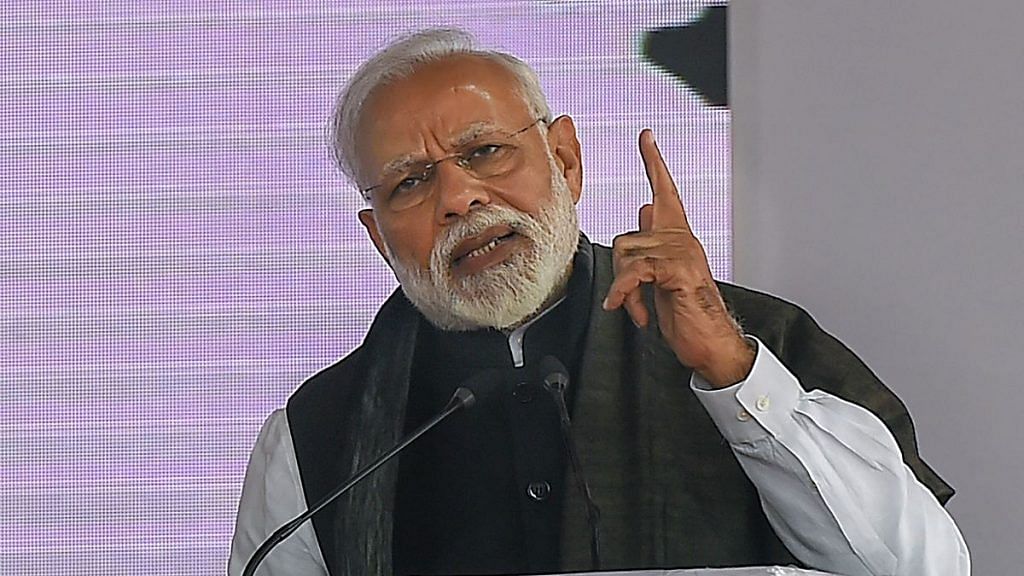Prime Minister Narendra Modi said that the security response to the Pulwama terror attack will be a ‘Muh Tod Jawab‘, a euphemism that the government has frequently used for retaliation. He said that the armed forces have been given full freedom to decide the mode, place and timing for the reprisal.
What does it really mean for a country’s leader to say that the Army has ‘full freedom’? Unless it is treated purely as a rhetorical statement at an election rally to convey a perceived continuation of a muscular stance against an implacable adversary, this articulation is misleading and problematic at several levels.
Who has a ‘free hand’?
Giving a ‘free hand’ to the armed forces when one is dealing with a nuclear power cannot be acceptable from a national security perspective. On the contrary, deeper political guidance and oversight are imperative while dealing with another nuclear power.
Such political oversight is required during planning and execution stages of the retaliatory actions. In practice, it entails greater civil-military interaction, and not a ‘free hand’ as the Prime Minister suggested.
The crystallisation of political objectives and identification of politically imposed constraints must be derived from a political-military dialogue, which serves to delineate the political framework.
The military’s ‘free hand’, therefore, is guided by the political framework. More importantly, the civil-military interaction has to mutually evaluate and comprehend the potential political and strategic gains and risks of a security response.
Only after a careful consideration of a plethora of factors, the final mode, timing and targets are approved by the political leadership. Before arriving at a final decision, political and military leaders need to have sufficient understanding of each other’s requirements, potential strengths and weaknesses. Such understanding is better achieved if there is regular interaction.
The challenge for the military leadership is to ensure that the political objectives are successfully translated into strategic effect through application of force.
Strategic effect will be mostly defined by the political value of the targets coupled with the scale of the damage inflicted on terrorist and military assets.
Accordingly, application of force will be shaped by the possible resistance that one can encounter and the scale of damage that needs to be inflicted. Such a response will also require intelligence gathering from non-military government agencies.
Ipso facto, while the armed forces are at the forefront of any operation, they act as per the political direction.
Therefore, Prime Minister Modi’s statement on giving a ‘free hand’ to the armed forces is misleading, because only the political leadership has a ‘free hand’, depending on the risks they are willing to take.
Also read: To war or not to war with Pakistan: Strategy, not public mood, should drive Modi govt
Sending a wrong signal?
The recently established Defence Planning Committee headed by the national security adviser has definitely made it even more difficult for the armed forces to act on their own.
At the top decision-making level, military does not and should not have a ‘free hand’ for their role is instrumental. It is at the tactical level, which involves execution of an operation, where military commanders need the freedom to act.
The PM’s statement of ‘free hand’ to the armed forces should not be misinterpreted to indicate that the actions undertaken are without political approval and guidance and the armed forces are solely responsible for success or failure.
The ‘freedom to the military’ narrative also has potential to reverberate internationally. Strategic experts may read it as a signal for nuclear escalation, especially because Pakistan’s military can operate independently of its civilian government’s control.
The tensions in India’s civil-military relationship can also be cited to craft a narrative that the situation could reach a nuclear flashpoint. This could well impact international support for India negatively.
The political leadership must determine the purpose and nature of the military reaction. The purpose, in this case, is to assuage the emotional upsurge and the natural desire for vengeance among the people.
The deterrence, if any, will be marginal and temporary. In the long-term, it can strengthen the Pakistan Army and its terrorist proxies, who can leverage the ‘threat from India’ to their advantage.
Yet, the government has to react robustly, given that it has oversold the post-Uri surgical strikes and faces an election in the next two months.
However, there is much to gain if the political leadership acknowledges the nature of the retaliatory action, which is vengeance primarily aimed at assuaging the domestic audience.
It is natural for militaries to seek a ‘free hand’. But politicians must control the momentum of military interaction through a rational approach. As Carl von Clausewitz famously said that although war has its own grammar, it cannot have its own logic. A ‘free hand’ to the military bestows it with its own rationality.
When dealing with a nuclear-armed country, even the political leadership’s freedom to direct use of maximum force is curtailed.
Treading discreetly, staying vigilant and having an unambiguous diplomatic goal may be better options to extract meaningful revenge. A ‘free hand’ is a hazardous approach that promises no happy endings.
Also read: Don’t politicise Pulwama attack, Modi & Shah say but won’t stop themselves
Lt Gen (Dr) Prakash Menon PVSM, AVSM, VSM is director of Strategic Studies Programme at the Takshashila Institution, Bengaluru, and former military adviser in the National Security Council Secretariat, New Delhi. He is the author of Strategy Trap: India and Pakistan Under the Nuclear Shadow.
